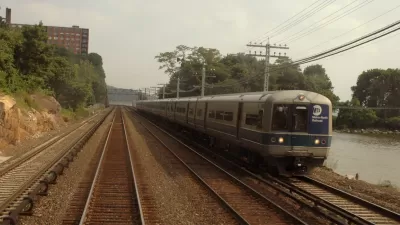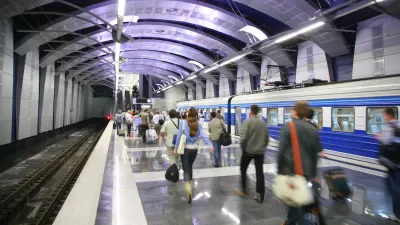Yonah Freemark tackles the big question, as House Republicans deliver an agenda to reduce federal spending that proposes deep cuts to transit spending.
The answer? Rural and non-urban districts tend to elect Republicans, and urban centers elect Democrats:
"The two parties generally fight it out over the suburbs. In essence, the base of the two parties is becoming increasingly split in spatial terms: The Democrats' most vocal constituents live in cities, whereas the Republicans' power brokers would never agree to what some frame as a nightmare of tenements and light rail."
Freemark has some excellent graphs over at The Transport Politic showing just how split the nation is on urban/rural lines and how that correlates to political party preferences.
Freemark writes, "Republicans in the House of Representatives know that very few of their constituents would benefit directly from increased spending on transit, for instance, so they propose gutting the nation's commitment to new public transportation lines when they enter office."
FULL STORY: Understanding the Republican Party’s Reluctance to Invest in Transit Infrastructure

Study: Maui’s Plan to Convert Vacation Rentals to Long-Term Housing Could Cause Nearly $1 Billion Economic Loss
The plan would reduce visitor accommodation by 25,% resulting in 1,900 jobs lost.

North Texas Transit Leaders Tout Benefits of TOD for Growing Region
At a summit focused on transit-oriented development, policymakers discussed how North Texas’ expanded light rail system can serve as a tool for economic growth.

Using Old Oil and Gas Wells for Green Energy Storage
Penn State researchers have found that repurposing abandoned oil and gas wells for geothermal-assisted compressed-air energy storage can boost efficiency, reduce environmental risks, and support clean energy and job transitions.

Planting Relief: Tackling Las Vegas Heat One Tree at a Time
Nevada Plants, a Las Vegas-based nonprofit, is combating the city’s extreme urban heat by giving away trees to residents in underserved neighborhoods, promoting shade, sustainability, and community health.

How Madison’s Tree Planting Efforts Are Growing a Healthier Community
Madison’s annual tree planting initiative is enhancing environmental resilience, public health, and community livability by adding 1,400 carefully selected trees citywide, with strong community and institutional support for urban forestry.

Texas State Bills Could Kill Transit Funding in Dallas, Austin
State lawmakers could pull funding from the state’s largest transit agency and the ambitious Project Connect, a voter-approved transit project in Austin.
Urban Design for Planners 1: Software Tools
This six-course series explores essential urban design concepts using open source software and equips planners with the tools they need to participate fully in the urban design process.
Planning for Universal Design
Learn the tools for implementing Universal Design in planning regulations.
Ascent Environmental
Borough of Carlisle
Institute for Housing and Urban Development Studies (IHS)
City of Grandview
Harvard GSD Executive Education
Toledo-Lucas County Plan Commissions
Salt Lake City
NYU Wagner Graduate School of Public Service




























